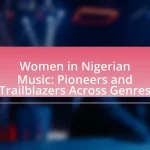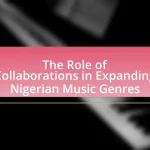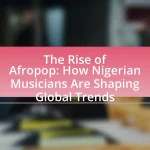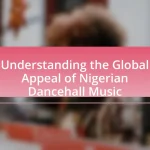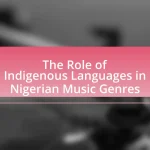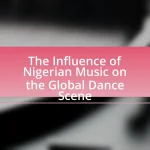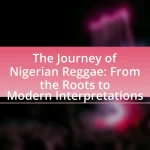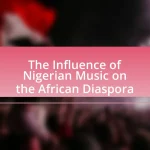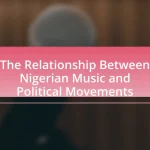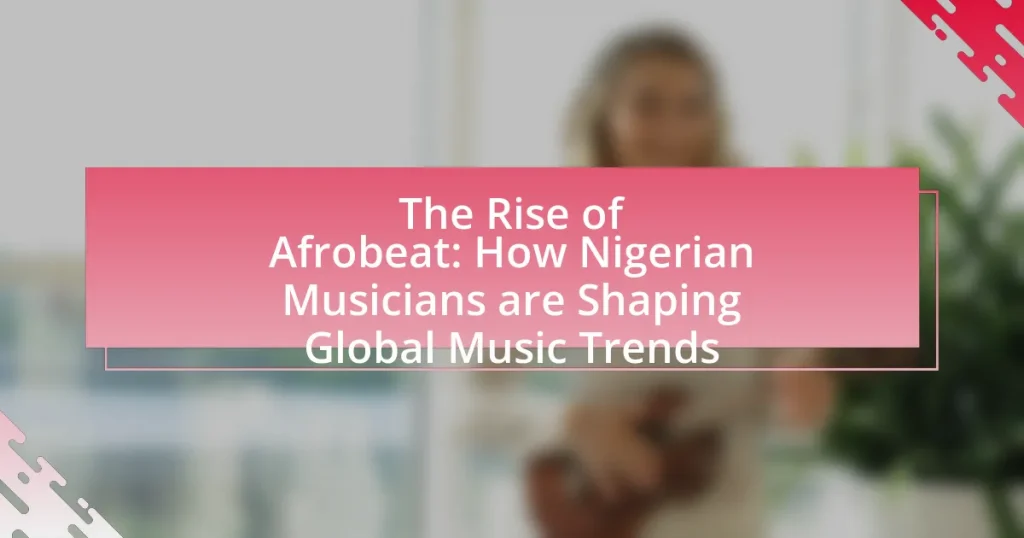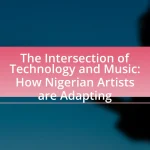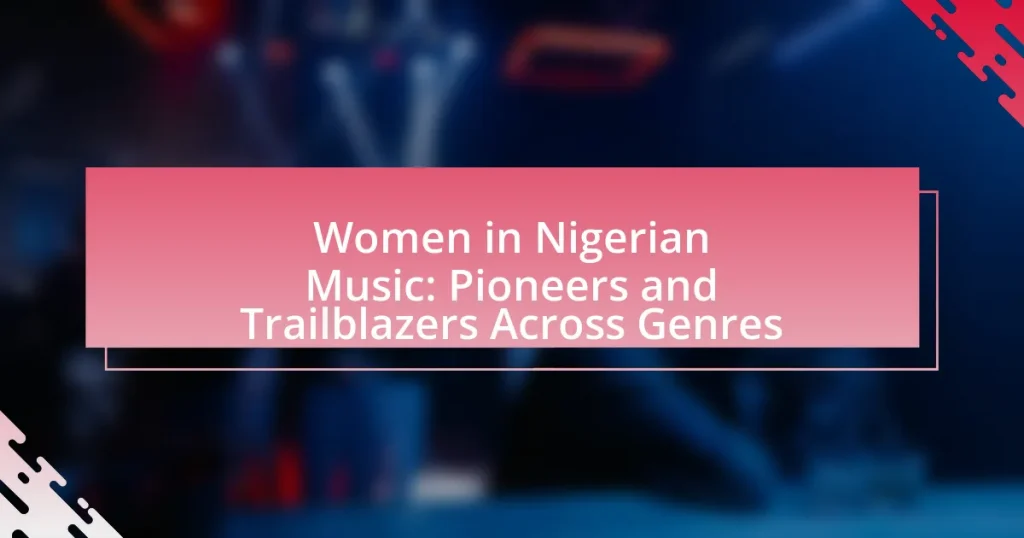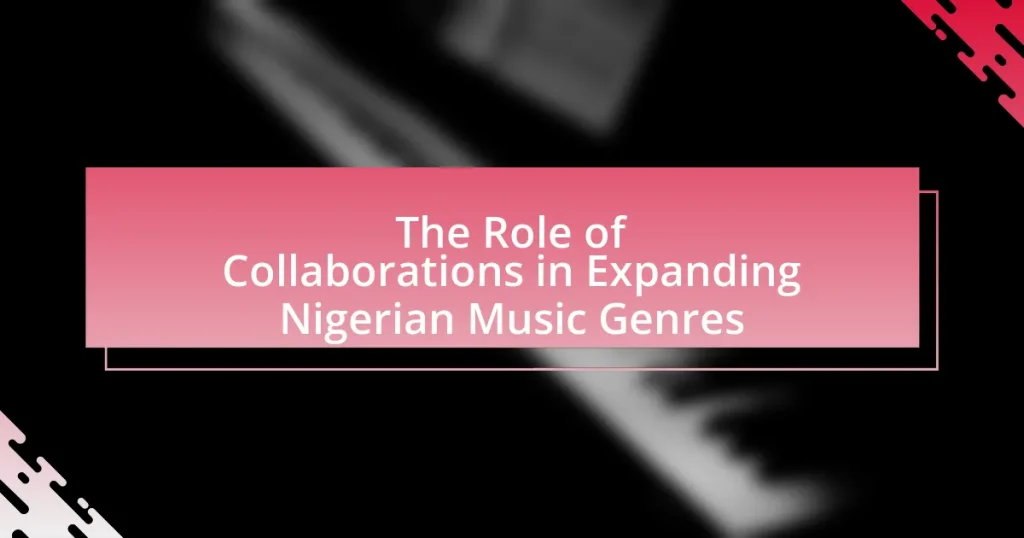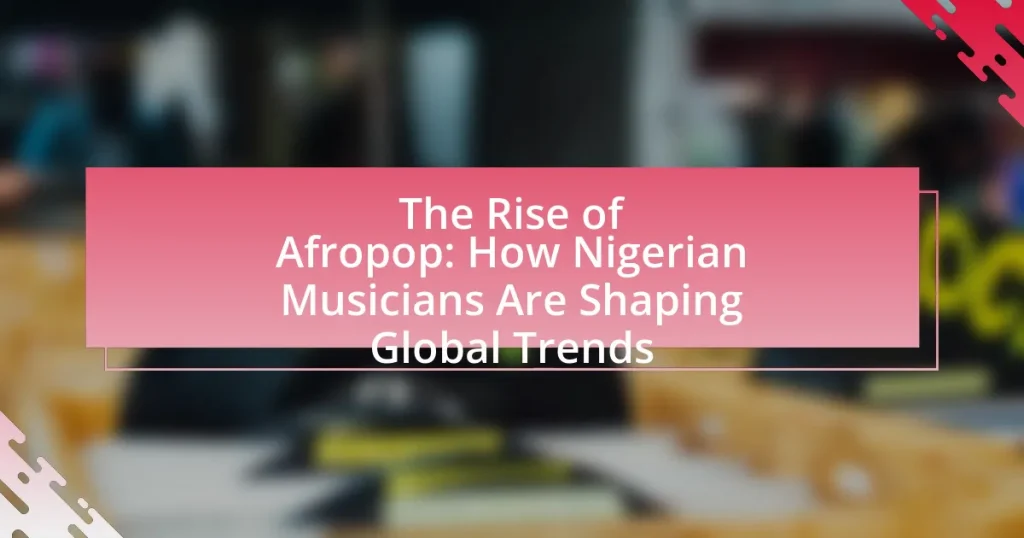Afrobeat is a dynamic music genre that originated in Nigeria during the 1960s, primarily developed by musician Fela Kuti, who blended traditional African rhythms with jazz, funk, and highlife to create a politically charged sound. The genre is characterized by complex polyrhythms, vibrant instrumentation, and socially conscious lyrics, gaining global recognition through artists like Burna Boy and Wizkid. This article explores the cultural influences that shaped Afrobeat, its defining characteristics, key pioneers, and the significant role Nigerian musicians play in influencing global music trends. Additionally, it examines the challenges faced by Afrobeat artists in the international market and the future prospects for the genre as it continues to evolve and gain popularity worldwide.
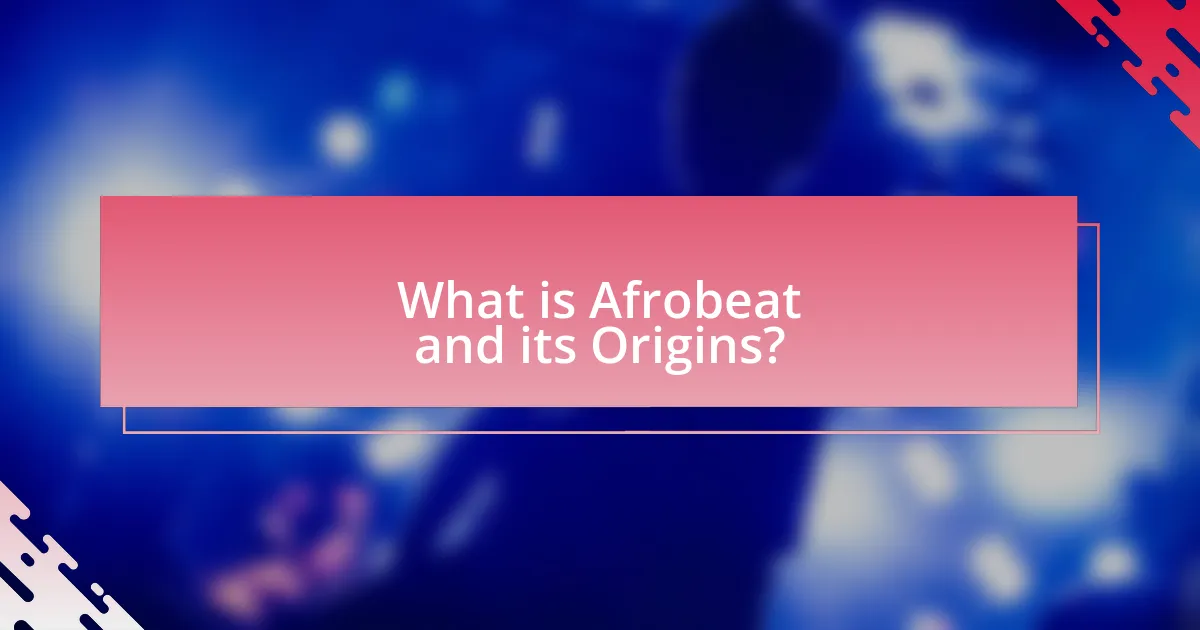
What is Afrobeat and its Origins?
Afrobeat is a music genre that combines traditional African rhythms, jazz, funk, and highlife, characterized by its complex polyrhythms and vibrant instrumentation. The origins of Afrobeat can be traced back to the 1960s in Nigeria, primarily developed by musician Fela Kuti, who fused African musical elements with Western styles to create a politically charged sound that addressed social issues. Kuti’s work laid the foundation for Afrobeat, which has since evolved and influenced various global music trends, reflecting its roots in African culture and its adaptability to contemporary sounds.
How did Afrobeat emerge as a musical genre?
Afrobeat emerged as a musical genre in the late 1960s, primarily through the innovative work of Nigerian musician Fela Kuti. Kuti combined traditional African rhythms, particularly from Nigeria, with jazz, funk, and highlife, creating a unique sound characterized by complex polyrhythms and socially conscious lyrics. The genre gained prominence as Kuti used his music as a platform for political activism, addressing issues such as corruption and colonialism in Nigeria. Afrobeat’s influence expanded globally, impacting various music styles and inspiring artists worldwide, thus solidifying its place in contemporary music culture.
What cultural influences contributed to the development of Afrobeat?
Afrobeat developed through a blend of various cultural influences, primarily West African traditional music, jazz, highlife, and funk. West African traditional music provided rhythmic and melodic foundations, while jazz introduced improvisational elements and complex harmonies. Highlife contributed its danceable rhythms and instrumentation, and funk added a strong backbeat and groove, which were essential in shaping the sound of Afrobeat. These influences coalesced in the 1960s and 1970s, particularly through the work of musicians like Fela Kuti, who synthesized these styles to create a unique genre that resonated both locally and internationally.
Who are the key pioneers of Afrobeat music?
The key pioneers of Afrobeat music are Fela Kuti, Tony Allen, and Antibalas. Fela Kuti, often regarded as the father of Afrobeat, fused traditional African rhythms with jazz and funk, creating a unique sound that gained international recognition. Tony Allen, as Kuti’s drummer, played a crucial role in developing the genre’s complex rhythms and polyrhythmic structures. Antibalas, a Brooklyn-based band, further popularized Afrobeat in the late 1990s and early 2000s, blending it with contemporary influences while maintaining its core elements. These artists collectively shaped the evolution and global appeal of Afrobeat music.
What are the defining characteristics of Afrobeat?
Afrobeat is characterized by its fusion of traditional African music, jazz, highlife, and funk, creating a complex rhythmic structure. This genre typically features intricate polyrhythms, extended instrumental sections, and socially conscious lyrics that address political and cultural issues. Notably, the use of brass instruments, electric guitars, and percussion is prevalent, contributing to its vibrant sound. The genre was popularized by Nigerian musician Fela Kuti in the 1970s, who emphasized the importance of live performances and improvisation, further solidifying Afrobeat’s identity as a dynamic and engaging musical form.
How does Afrobeat blend different musical styles?
Afrobeat blends different musical styles by integrating elements of traditional African music, jazz, funk, and highlife. This fusion is characterized by complex rhythms, vibrant horn sections, and call-and-response vocals, which create a unique sound that resonates globally. The genre’s pioneer, Fela Kuti, combined these influences to craft a politically charged musical form that reflects both cultural heritage and contemporary issues, demonstrating Afrobeat’s ability to adapt and innovate while maintaining its roots.
What instruments are commonly used in Afrobeat music?
Afrobeat music commonly utilizes instruments such as the electric guitar, bass guitar, drums, keyboards, and brass instruments like trumpets and saxophones. These instruments create a rich, layered sound that blends traditional African rhythms with jazz and funk influences. The electric guitar and bass guitar provide the harmonic foundation, while the drums establish the rhythmic drive. Keyboards add melodic and harmonic textures, and brass instruments contribute to the vibrant, energetic feel characteristic of Afrobeat. This combination of instruments is essential in defining the genre’s unique sound and has been pivotal in its global influence.
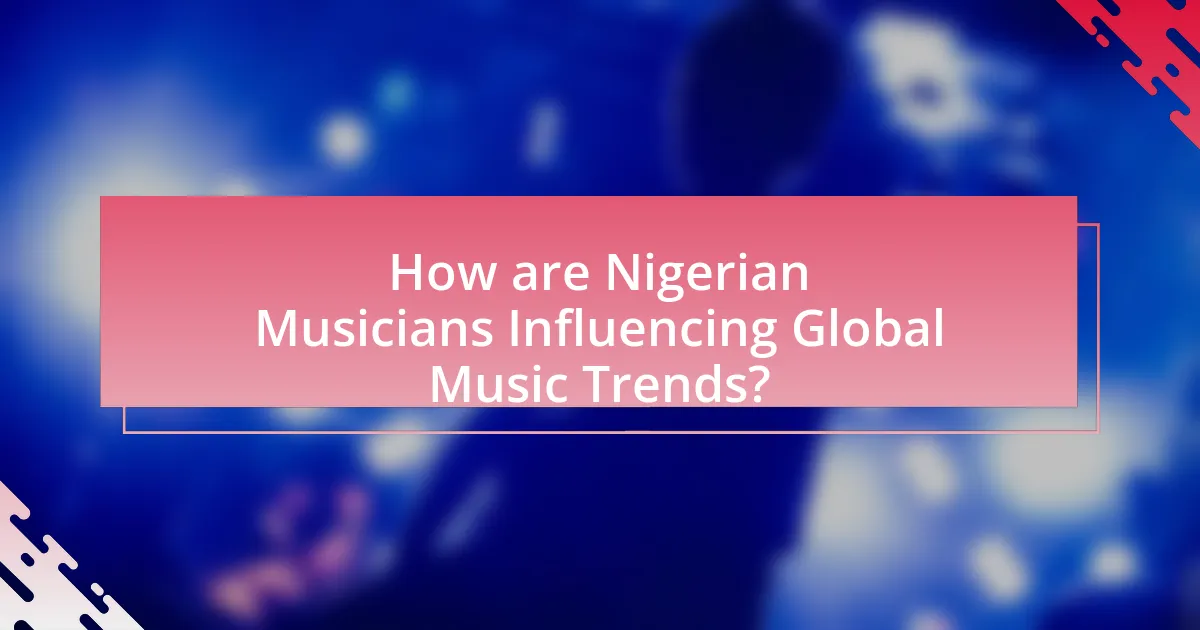
How are Nigerian Musicians Influencing Global Music Trends?
Nigerian musicians are significantly influencing global music trends through the rise of Afrobeat, which blends traditional African rhythms with contemporary genres like hip-hop and R&B. This genre has gained international recognition, with artists such as Burna Boy and Wizkid achieving chart-topping success worldwide. For instance, Burna Boy’s album “Twice as Tall” won the Grammy Award for Best Global Music Album in 2021, showcasing the global appeal of Nigerian music. Additionally, collaborations between Nigerian artists and international stars, such as Beyoncé’s inclusion of Wizkid in “Brown Skin Girl,” further amplify the reach and impact of Afrobeat on global music culture.
What role do Nigerian artists play in the global music scene?
Nigerian artists play a pivotal role in the global music scene by popularizing Afrobeat and influencing various genres worldwide. This genre, which blends traditional African rhythms with jazz, funk, and hip-hop, has gained international acclaim, with artists like Burna Boy and Wizkid achieving significant chart success. For instance, Burna Boy’s album “African Giant” was nominated for a Grammy Award, showcasing the global recognition of Nigerian music. Additionally, collaborations between Nigerian artists and international stars, such as Beyoncé’s feature of Wizkid in “Brown Skin Girl,” further highlight their impact on global music trends. This cross-cultural exchange not only elevates Nigerian music but also enriches the global music landscape, making Nigerian artists key players in shaping contemporary sounds.
How have collaborations with international artists impacted Afrobeat’s reach?
Collaborations with international artists have significantly expanded Afrobeat’s global reach. By partnering with well-known musicians from various genres, Afrobeat artists have gained access to broader audiences and increased visibility in international markets. For instance, Burna Boy’s collaboration with American rapper JAY-Z on the track “Mo Money Mo Problems” and Wizkid’s feature on Drake’s “One Dance” propelled Afrobeat into mainstream music charts, leading to increased streaming numbers and international tours. These collaborations not only enhance the genre’s appeal but also foster cultural exchange, allowing Afrobeat to influence and be influenced by diverse musical styles, thereby solidifying its place in the global music landscape.
What platforms are most effective for promoting Afrobeat globally?
Social media platforms, particularly Instagram, TikTok, and YouTube, are the most effective for promoting Afrobeat globally. These platforms enable artists to share music videos, engage with fans, and create viral content that reaches a wide audience. For instance, TikTok has been instrumental in popularizing Afrobeat tracks through dance challenges, leading to significant streaming increases on platforms like Spotify and Apple Music. Additionally, YouTube serves as a primary channel for music video releases, with Afrobeat artists often amassing millions of views, which further boosts their global visibility.
Why is Afrobeat gaining popularity outside Nigeria?
Afrobeat is gaining popularity outside Nigeria due to its infectious rhythms, fusion of diverse musical styles, and the global reach of Nigerian artists. The genre combines traditional African music with jazz, funk, and highlife, creating a unique sound that appeals to a wide audience. Additionally, artists like Burna Boy and Wizkid have achieved international success, with Burna Boy winning a Grammy Award for Best World Music Album in 2020, which has significantly raised the profile of Afrobeat on the global stage. The rise of streaming platforms has also facilitated access to Afrobeat music, allowing listeners worldwide to discover and enjoy the genre.
What factors contribute to the global appeal of Afrobeat music?
The global appeal of Afrobeat music is primarily driven by its infectious rhythms, diverse musical influences, and cultural storytelling. Afrobeat combines traditional African music elements with jazz, funk, and highlife, creating a unique sound that resonates with a wide audience. The genre’s ability to address social and political issues through lyrics, as exemplified by Fela Kuti’s work, enhances its relevance and connection to listeners worldwide. Additionally, the rise of digital platforms has facilitated the global distribution of Afrobeat, allowing artists like Burna Boy and Wizkid to reach international markets and collaborate with global stars, further expanding its influence.
How do social media and streaming services facilitate Afrobeat’s rise?
Social media and streaming services significantly facilitate Afrobeat’s rise by providing platforms for global exposure and audience engagement. These digital channels allow Afrobeat artists to share their music widely, reaching international listeners without the need for traditional distribution methods. For instance, platforms like Spotify and Apple Music have playlists dedicated to Afrobeat, which increases visibility and accessibility. Additionally, social media platforms such as Instagram and TikTok enable artists to connect directly with fans, promote their work, and create viral trends, further amplifying their reach. The success of artists like Burna Boy and Wizkid, who gained international recognition through these platforms, exemplifies how social media and streaming services have transformed Afrobeat into a global phenomenon.

What are the Future Prospects for Afrobeat?
The future prospects for Afrobeat are highly promising, driven by its increasing global popularity and integration into mainstream music. Afrobeat artists, such as Burna Boy and Wizkid, have achieved international recognition, evidenced by Grammy wins and collaborations with global stars like Beyoncé and Drake. The genre’s fusion of traditional African rhythms with contemporary sounds appeals to diverse audiences, enhancing its reach. Additionally, the rise of digital streaming platforms has facilitated the global distribution of Afrobeat music, allowing artists to connect with fans worldwide. As cultural exchange continues to grow, Afrobeat is likely to influence and shape future music trends, solidifying its position in the global music landscape.
How might Afrobeat evolve in the coming years?
Afrobeat is likely to evolve through increased global collaboration and fusion with other genres, driven by the rise of digital platforms that facilitate cross-cultural exchanges. As artists from different backgrounds collaborate, Afrobeat may incorporate elements from genres like hip-hop, electronic, and pop, enhancing its appeal to a broader audience. The success of Nigerian artists such as Burna Boy and Wizkid, who have already integrated diverse musical influences, exemplifies this trend. Additionally, the growing popularity of Afrobeat in international markets, evidenced by chart-topping hits and sold-out global tours, suggests that the genre will continue to gain traction and influence, further shaping global music trends.
What trends are emerging within the Afrobeat genre?
Emerging trends within the Afrobeat genre include a fusion of traditional African rhythms with global music styles, increased collaboration with international artists, and a growing emphasis on social and political themes in lyrics. This genre is increasingly incorporating elements from hip-hop, dancehall, and electronic music, which broadens its appeal and reach. Notably, artists like Burna Boy and Wizkid have collaborated with global stars such as Beyoncé and Drake, showcasing Afrobeat’s rising influence in mainstream music. Additionally, the genre’s focus on addressing social issues, such as inequality and corruption, resonates with a global audience, further solidifying its relevance and impact.
How can new artists contribute to the evolution of Afrobeat?
New artists can contribute to the evolution of Afrobeat by infusing contemporary genres and innovative sounds into traditional Afrobeat rhythms. This integration allows for the creation of hybrid styles that resonate with diverse audiences, thereby expanding the genre’s reach. For instance, artists like Burna Boy and Wizkid have successfully blended Afrobeat with elements of dancehall, hip-hop, and R&B, which has led to increased global recognition and collaborations with international artists. Such collaborations not only enhance the genre’s appeal but also introduce Afrobeat to new markets, further solidifying its place in the global music landscape.
What challenges do Afrobeat musicians face in the global market?
Afrobeat musicians face significant challenges in the global market, including limited access to international distribution channels and inadequate marketing resources. These musicians often struggle to secure contracts with major record labels, which can hinder their ability to reach wider audiences. Additionally, cultural barriers and a lack of understanding of Afrobeat music among global audiences can impede its acceptance and growth. According to a report by the International Federation of the Phonographic Industry, African music accounted for only 1.5% of global recorded music revenue in 2020, highlighting the economic challenges faced by Afrobeat artists in competing with more established genres.
How do issues of cultural appropriation affect Afrobeat artists?
Cultural appropriation significantly affects Afrobeat artists by undermining their cultural identity and economic opportunities. When elements of Afrobeat are adopted by non-African artists without proper acknowledgment or compensation, it can lead to a dilution of the genre and misrepresentation of its cultural significance. For instance, high-profile collaborations or performances by Western artists often receive more media attention and financial backing than the original Afrobeat creators, which can marginalize the voices of the artists who pioneered the genre. This dynamic not only impacts the visibility of Afrobeat artists but also raises concerns about ownership and authenticity in a global music landscape increasingly influenced by cultural exchange.
What barriers exist for Nigerian musicians seeking international success?
Nigerian musicians face several barriers in their pursuit of international success, including limited access to global distribution channels, inadequate funding for marketing and promotion, and challenges related to copyright and intellectual property protection. The lack of established international networks makes it difficult for these artists to reach wider audiences. Additionally, cultural and language differences can hinder their ability to connect with global markets. According to a report by the International Federation of the Phonographic Industry, only a small percentage of Nigerian music is distributed internationally, highlighting the challenges in accessing global platforms.
What can aspiring Afrobeat artists learn from current trends?
Aspiring Afrobeat artists can learn the importance of collaboration and genre fusion from current trends. Collaborations with artists from diverse genres, such as hip-hop and pop, have significantly contributed to the global appeal of Afrobeat, as seen in the success of artists like Burna Boy and Wizkid, who have partnered with international stars like Ed Sheeran and Drake. This blending of styles not only broadens their audience but also enhances their musical creativity, making their work more relatable and engaging to a wider demographic. Additionally, the rise of digital platforms for music distribution emphasizes the need for artists to leverage social media and streaming services to reach global audiences, as demonstrated by the rapid growth of Afrobeat’s popularity on platforms like Spotify and Apple Music.
What strategies can new artists adopt to succeed in the Afrobeat genre?
New artists can succeed in the Afrobeat genre by focusing on collaboration, leveraging social media, and understanding the cultural roots of the music. Collaborating with established Afrobeat artists can enhance visibility and credibility, as seen with artists like Wizkid and Burna Boy, who have gained international recognition through strategic partnerships. Utilizing social media platforms such as Instagram and TikTok allows artists to reach a global audience quickly; for instance, viral challenges and dance trends have propelled many Afrobeat songs to mainstream success. Additionally, a deep understanding of the genre’s cultural significance and musical elements, such as rhythm and instrumentation, is crucial, as it helps artists create authentic and resonant music that appeals to both local and international listeners.
How important is cultural authenticity for Afrobeat musicians today?
Cultural authenticity is critically important for Afrobeat musicians today as it serves as a foundation for their identity and artistic expression. Afrobeat, rooted in African rhythms and cultural narratives, relies on genuine representation to resonate with audiences both locally and globally. The genre’s success hinges on its ability to reflect the socio-political realities and cultural heritage of Nigeria, which is evident in the works of influential artists like Fela Kuti and contemporary musicians such as Burna Boy. These artists often incorporate traditional instruments, indigenous languages, and themes that address social issues, reinforcing the significance of authenticity in their music. This commitment to cultural roots not only fosters a deeper connection with fans but also enhances the genre’s credibility in the global music landscape, as seen in the increasing recognition of Afrobeat at international award shows and festivals.
